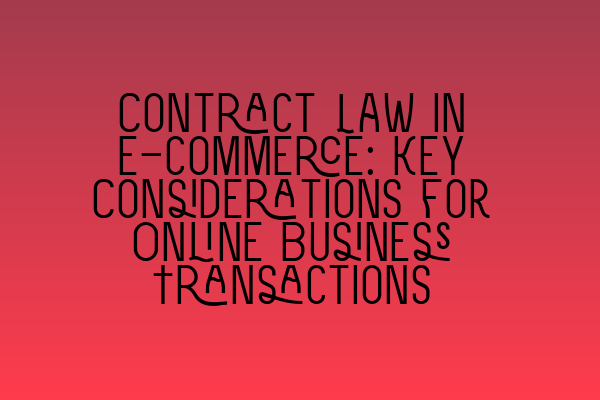Contract Law in E-commerce: Key Considerations for Online Business Transactions
In today’s digital age, e-commerce has become a vital platform for businesses to reach a wider audience and conduct transactions with ease. However, the convenience of online business transactions does not exempt them from the legal principles of contract law. Understanding the key considerations of contract law in e-commerce is crucial to ensure that your online business transactions are legally valid and enforceable. Whether you are a business owner or an individual engaging in online commerce, this article will provide you with valuable insights and tips to navigate the contractual landscape of e-commerce.
1. Offer and Acceptance
Like any other contract, an online contract in e-commerce consists of an offer and acceptance. The offer is made by the seller through their website or online platform, specifying the terms and conditions of the transaction. The acceptance occurs when the buyer agrees to those terms and conditions by clicking a button or taking any other predetermined action. It is important to clearly communicate all essential terms of the offer to avoid any confusion or disputes later on.
2. Formation of Contract
The formation of a contract in e-commerce is governed by the same basic principles as traditional contracts. However, in online transactions, the process may differ slightly. It is crucial to ensure that the buyer has a clear and unequivocal opportunity to review the terms of the contract before accepting them. This can be achieved by providing a prominent “terms and conditions” or “checkout” page where all relevant information is clearly stated. Additionally, using checkboxes or confirmation buttons can help establish that the buyer has read and understood the terms before proceeding.
3. Electronic Signatures
One of the unique aspects of e-commerce contracts is the use of electronic signatures. Electronic signatures are generally recognized as legally valid and enforceable, provided they meet specific requirements. It is advisable to use technological means to capture electronic signatures and ensure their authenticity and integrity. This can include methods such as click-to-accept buttons, digital certificates, or secure electronic verification processes. Properly implementing electronic signatures will enhance the enforceability of your online contracts.
4. Consumer Protection
When engaging in e-commerce, it is important to be aware of the various consumer protection laws and regulations that may apply. These laws aim to protect consumers from unfair practices and ensure transparency in online transactions. As an online business, it is crucial to provide accurate and complete information about your products or services, including pricing, warranties, and refund policies. Failure to comply with consumer protection laws can lead to legal consequences and damage your business reputation.
5. Jurisdiction and Choice of Law
E-commerce transactions often involve parties from different jurisdictions. Determining the applicable law and jurisdiction for resolving disputes is essential. Including a well-drafted choice of law and jurisdiction clause in your online contracts can help provide clarity and avoid potential conflicts. It is advisable to seek legal advice to ensure that your choice of law and jurisdiction clause is enforceable and reflects your business needs.
In conclusion, contract law plays a vital role in ensuring the legality and enforceability of online business transactions. By understanding and implementing the key considerations discussed in this article, you can protect your interests and establish confidence and trust with your customers. If you are preparing for the SQE exams, make sure to check out our related articles on SQE 1 Practice Exam Questions, SQE 1 Practice Mocks FLK1 FLK2, SQE 2 Preparation Courses, SQE 1 Preparation Courses, and SRA SQE Exam Dates to further enhance your legal knowledge and exam readiness.
Stay tuned for more informative articles on contract law and various legal topics to help you thrive in the world of e-commerce. Don’t hesitate to reach out to SQE Contract Law for all your legal needs and queries.
